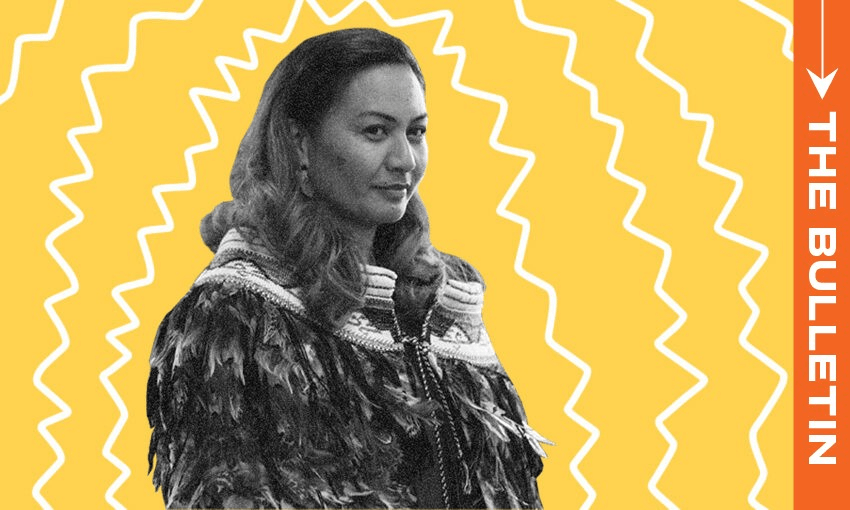The Green co-leader stepped back into the spotlight for the first time in eight months, writes The Bulletin’s Stewart Sowman-Lund.
To receive The Bulletin in full each weekday, sign up here.
‘We can come through’
Green co-leader Marama Davidson picked a busy week to mark her return to politics. After an eight month absence following a cancer diagnosis and treatment, Davidson joined her fellow leader, Chlöe Swarbrick, at Waitangi yesterday. The Green MP formally stepped back into the spotlight over the weekend, appearing for her first interview in about eight months. “I’m alive, I am well, and I’m getting better with each day,” Davidson told RNZ’s Mata Reports. “Some of the days have been tough, and then people come through with the support and the aroha.”
In an interview with RNZ’s Morning Report moments ago, Davidson described her return to the “political realm” as a “bit overwhelming”, but added that being removed from her day-to-day job had given her a “clearer view” of what mattered. 2024 was a challenging year for the Greens, with Davidson absent for about half of it. Along with the passing of Efeso Collins, there were scandals or incidents involving Golriz Ghahraman, Julie-Anne Genter and Darleen Tana. “We can come through,” Davidson said this morning. “We are ready for whatever is thrown at us. I am so pleased to be back to help the team out.”
The ‘ideal’ time to return
The timing of Davidson’s return is, of course, partly because of how her lengthy recovery has panned out. But it’s also a reminder of Davidson’s values. Speaking to reporters at Waitangi yesterday, Davidson described how difficult it was to step away from work “right when I felt needed on some really big issues”, reported Stuff. A profile of Davidson from Leonie Hayden in The Spinoff in 2020 gives a clear idea of how the MP views her position of power. “There’s no point in me sacrificing time away from my whānau unless I continue to do what I was put there to do, which is to represent the voices on the ground who feel like they are disconnected from power,” she said.
Many of the “big issues” will be front and centre of debate this week. The Treaty Principles Bill is currently before select committee, meaning it remains an omnipresent topic as politicians make their way to the Far North. “It’s an ideal time for me to make my return to politics,” Davidson said yesterday, reported Newsroom’s Laura Walters. “I purposefully wanted to pick up on the excitement and vibe of the nation, sending a clear message that they stand for kōtahitanga.”
Opposition rallies supporters
Waitangi organisers are expecting a particularly big turnout on Thursday, with some early predictions as high as 50,000. We’ll have plenty more coverage of this in The Bulletin all week. Despite the heightened political atmosphere, organisers are stressing a desire for peace. “It is back to basics,” Pita Tipene, the chairperson of the Waitangi National Trust, told Stuff’s Glenn McConnell.
The prime minister, Christopher Luxon, will not be among those welcomed onto the Treaty grounds. The coalition will still be well represented, with Act’s David Seymour likely to face the brunt of any protest. In the run up to the commemorations, the opposition has made early efforts to control the narrative. Like the Greens, Labour leader Chris Hipkins has already made the voyage north. “He’s at Waitangi, the PM isn’t, and he gets to take free shots,” wrote the Herald’s Simon Wilson (paywalled), in reference to Hipkins. In an opinion piece published yesterday, Hipkins criticised the prime minister for choosing not to visit the Treaty grounds this week. “Despite kicking off one of the most divisive debates on race relations in our lifetimes, prompting one of the biggest protests to parliament we’ve ever seen and record public participation in the submissions process on the Treaty Principles Bill, Christopher Luxon has declined to front up,” wrote Hipkins. (Luxon isn’t the first prime minister not to attend, it’s worth remembering – in recent years, Helen Clark, John Key and Bill English have all gone elsewhere on at least one occasion).
The conflicting arguments for Luxon
On the one hand, Luxon’s absence is understandable. He does not want to be associated with upset over the Treaty principles bill, a proposed piece of legislation he has repeatedly described as “divisive”. On the other, Luxon leads the government that decided to allow the bill to make it to select committee (The Spinoff’s Liam Rātana wrote a very level-headed opinion piece last year considering whether the financial cost of the Treaty debate was, actually, justified) and should be present to listen and respond.
As Newsroom’s Marc Daalder wrote last year, Luxon’s decision to head to the opposite end of the country for Waitangi Day (he’ll be spending it in Canterbury) comes after he conceded the Crown-Māori relationship had worsened under his government. “The political optics for critics are that he’s too afraid to show up – or, as Te Pāti Māori co-leader Rawiri Waititi put it, he ‘may be a drop-nuts’,” wrote Daalder. Leaving his coalition partners, and the opposition, to suck up most of the airtime on Thursday is a bold gamble by the prime minister. Whether it will pay off remains to be seen.
